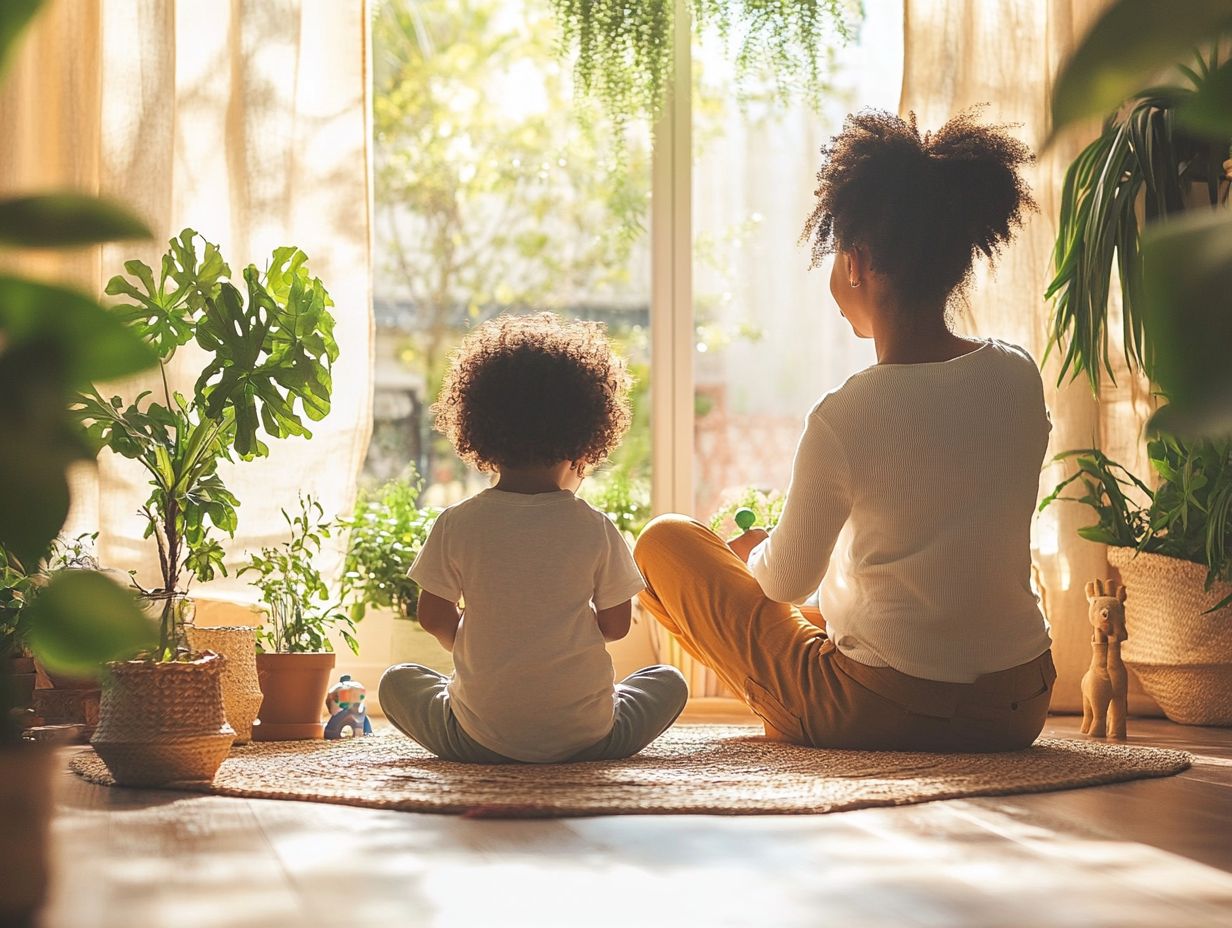Mindfulness and Parenting: Finding Peace
Contents
- Introduction
- Key Takeaways:
- Benefits of Mindfulness
- How Can Mindfulness Help in Parenting?
- What Are Some Mindful Parenting Techniques?
- How Can Parents Incorporate Mindfulness into Daily Life?
- Ready for More Mindful Parenting Tips?
- 1. Letting Go of Perfectionism
- 2. Practicing Non-Judgment and Acceptance
- 3. Cultivating a Growth Mindset
- Frequently Asked Questions
- What is mindfulness and how can it benefit my parenting?
- How can mindfulness help me find peace in my parenting journey?
- Unlocking Peace: How Mindfulness Can Transform Parenting
- Incorporating Mindfulness into a Busy Parent’s Daily Routine
- Engaging Mindfulness Practices to Do with Your Children
- Finding Peace in Your Parenting Journey through Mindfulness
Introduction
In today s fast-paced world, parenting can often feel like an overwhelming challenge, leaving you in search of ways to connect more deeply with your children while navigating the stresses and emotions of everyday life.
Mindfulness presents a transformative approach to parenting, focusing on patience and understanding instead of just obedience.
Get ready to discover the amazing impact mindfulness can have on your parenting journey! This article offers practical techniques to seamlessly integrate mindfulness into your daily routine, along with additional tips to cultivate a serene and mindful home environment.
By embracing mindfulness, you can usher in a sense of harmony to your parenting experience, addressing parenting challenges with calm responses.
Key Takeaways:

- Improved parent-child relationship through mindful communication and increased empathy.
- Better stress and emotion management for a more peaceful and positive parenting experience.
- Incorporating self-care, mindfulness routines, mindfulness apps, and modeling mindful behavior for children as key elements in incorporating mindfulness into daily life as a parent.
Benefits of Mindfulness
How Can Mindfulness Help in Parenting?
Mindfulness brings transformative benefits to your parenting journey, helping you navigate the complexities of raising children with greater ease. By embracing mindful parenting practices, you cultivate emotional awareness and reduce stress, allowing you to connect more deeply with your children’s needs and feelings. This enables you to respond with calmness rather than react impulsively.
Incorporating mindfulness practices into parenting dynamics can also help in stress management and emotional connection. Adopting this approach not only helps you tackle parenting challenges but also fosters a peaceful home environment where both you and your children can flourish together.
By prioritizing mindfulness, you can transform your family’s emotional landscape and manage stress more effectively, ultimately leading to healthier communication dynamics and stronger relationships. Mindfulness apps and seminars can provide added support on your journey.
1. Improved Parent-Child Relationship
An enhanced parent-child relationship is one of the most profound benefits of embracing mindfulness in your parenting journey, as it nurtures a deeper emotional connection with your child.
Mindful parenting invites you to be fully present in each moment, allowing you to actively listen and respond to your child s needs without judgment. By utilizing techniques like nonviolent communication a way to communicate without anger or punishment you can openly express your feelings and expectations without resorting to punitive measures.
Mindfulness practices help in reducing mental chatter and internal noise, fostering a deeper connection. For example, rather than scolding your child for misbehavior, consider discussing the emotions behind their actions to help them grasp the impact of their behavior.
By practicing empathy, you can validate your child s feelings, letting them know that it s perfectly natural to feel upset or frustrated. Mindful parenting encourages acceptance and curiosity over reactive parenting. This compassionate approach fosters trust and security, encouraging your child to express themselves freely and ultimately strengthening the bond between the two of you.
2. Better Management of Stress and Emotions
Mindfulness gives you the power to manage stress and emotions more effectively, allowing you to respond with calmness to the various challenges of parenting rather than reacting impulsively.
By cultivating an awareness of your feelings and thoughts, you can build a robust toolkit of self-regulation strategies that enhance resilience and emotional stability. Techniques such as focused breathing, body scans, and mindful observation enable you to pause and evaluate situations without being swayed by immediate emotional reactions.
This proactive approach not only helps diffuse stressful moments but also nurtures deeper connections with your children, as you become more attuned to your own emotional landscape. With consistent practice, you can navigate the complexities of parenting with clarity, reducing feelings of overwhelm and enriching your overall parenting journey.
Mind-body practices like yoga and meditation can also be integrated to support emotional regulation and stress relief.
3. Enhanced Communication with Children
Enhanced communication with your children is a significant advantage of practicing mindfulness in parenting. It encourages you to engage in reflective listening, allowing you to grasp your children’s emotions on a deeper level.
By actively employing these communication strategies, you can cultivate an environment where your children feel truly heard and valued an essential foundation for their emotional development.
Recognizing emotional triggers those moments when your child may react with heightened intensity enables you to respond with empathy rather than frustration. By minimizing internal distractions and anxieties, you can be more present during conversations, paving the way for meaningful exchanges.
Mindfulness also improves communication and fosters cooperative children through reflective listening.
This mindful approach not only fortifies the bond between you and your child but also equips them with the tools to express themselves openly, nurturing their confidence and self-awareness.
4. Increased Patience and Empathy
Practices like body awareness and breath observation are crucial for building patience and empathy in your parenting journey.
Mindfulness nurtures a greater sense of patience and empathy within you as a parent, enabling you to tackle parenting challenges with a compassionate and understanding approach.
By weaving mindfulness practices into your daily routine, you can cultivate heightened emotional awareness that not only elevates your well-being but also enriches your interactions with your children.
This deeper connection allows you to respond more attuned to their emotions and behaviors, creating an environment where your children feel truly understood and valued.
Practicing presence transforms how you handle stress, equipping you to navigate stressful situations with calmness and avoiding knee-jerk reactions that might escalate tensions. Instead, you can choose to respond with thoughtful consideration, ultimately strengthening the parent-child bond and fostering a supportive atmosphere where your children can flourish.
What Are Some Mindful Parenting Techniques?

Incorporating techniques from mindfulness research and coaching courses can deepen your practice.
Mindful parenting techniques offer you practical strategies to elevate your parenting experience while cultivating a deeper connection with your children through mindfulness practices. By integrating these approaches, you can create a more intentional and enriching environment for both yourself and your kids.
1. Mindful Breathing Exercises
Engaging in mindful breathing exercises can be a transformative practice for parents, helping to alleviate stress and enhance emotional regulation in the midst of parenting challenges. By committing just a few moments each day to focus on your breath, you can cultivate a sense of calm and clarity that gives you the power to navigate parenting with greater ease.
Breath awareness as part of your mindfulness exercises can significantly impact your stress response. These exercises promote deeper inhalations and extended exhalations, effectively signaling your body to relax and thereby diminishing overall anxiety.
As you learn to manage your emotional responses, you naturally model healthy self-regulation for your children, fostering more positive interactions.
This approach not only enhances your personal well-being but also strengthens the bond between you and your child, creating a nurturing environment where both of you can truly thrive.
Start practicing these mindful parenting techniques today to enhance your parenting experience!
2. Practicing Gratitude and Appreciation
Practicing gratitude and appreciation serves as a powerful mindfulness technique that profoundly strengthens the emotional bond between parents and children, creating a positive family atmosphere.
By weaving regular gratitude practices into your daily routines, you can cultivate a deeper understanding of each other’s feelings and needs. This intentional focus on acknowledging those small moments of joy be it a thoughtful gesture or a shared laugh encourages everyone to express their emotions more openly. As you model this behavior, you not only enhance your own emotional awareness but also impart invaluable life skills to your children. Mindful practices like these contribute to a more harmonious family life.
Ultimately, such practices lead to improved communication, reduced stress, and a generally happier home environment, all of which are essential for fostering healthy family dynamics.
3. Mindful Listening and Presence
Mindful listening and presence are essential techniques that give the power to you to be fully engaged and attentive to your child’s needs and emotions. By honing in on the words your child speaks, as well as the non-verbal cues expressed through tone and body language, you equip yourself to grasp the underlying feelings they may be experiencing.
This practice fosters a deeper emotional connection, showing your child that their thoughts and feelings are both valued and acknowledged.
Adopting this approach not only enhances communication but also encourages your child to express themselves more openly, which leads to increased emotional awareness for both of you. Ultimately, when you practice mindful listening, you create a safe and supportive environment that nurtures healthy relationships and promotes overall emotional development. This approach helps in reducing mental chatter and focusing on what truly matters.
4. Setting Boundaries and Limits with Compassion
Establishing boundaries with compassion is essential for your journey as a mindful parent, nurturing respect while fostering healthy emotional development in your children. It’s important to note that these practices are also beneficial for neurodiverse families.
When you approach the nuanced task of setting boundaries with empathy, you create an atmosphere that promotes open dialogue and deeper understanding. By employing nonviolent communication techniques, you can significantly enhance this process, allowing both you and your children to express needs and feelings without the fear of judgment. Understanding children’s needs and children’s emotions is crucial in this journey.
This approach underscores emotional awareness, enabling you to recognize your children’s feelings while clearly articulating your own boundaries. Incorporating awareness practices can further enhance your ability to connect with your children.
As a result, your children will learn the value of respecting themselves and others, contributing to a harmonious family dynamic that ultimately supports their growth into emotionally intelligent individuals. This is especially important in a neurodiverse family, where understanding and respecting each person’s unique needs is paramount.
How Can Parents Incorporate Mindfulness into Daily Life?
Experts like Jon Kabat-Zinn and Hunter Clarke-Fields from the book Raising Good Humans provide valuable insights into this process.
Incorporating mindfulness into your daily life is essential if you aspire to cultivate a peaceful home environment and nurture cooperative children. This can also contribute to stress reduction for both parents and children.
By embracing consistent mindful practices, you can foster a sense of tranquility and connection within your family, as advocated by the New York Insight Center.
1. Prioritizing Self-Care

Prioritizing self-care is essential for you as a parent to sustain your emotional presence and practice mindfulness in your parenting approach. This is something emphasized by experts like Judith Hanson Lasater and Chelom Eastwood Leavitt.
Taking time for yourself allows you to recharge. This enables you to engage more fully with your children, fostering a nurturing environment.
Embracing mindfulness practices whether it s meditation, deep breathing, or a refreshing walk in nature can significantly reduce your stress levels and enhance your mental health, contributing to a more serene atmosphere at home.
By consistently embracing these self-care habits, you not only improve your own emotional well-being but also model healthy emotional regulation for your children. This enhances your relationship with them and cultivates resilience, ensuring that you can navigate life s challenges together with calmness and clarity.
2. Creating Mindful Routines and Rituals
Creating mindful routines is an exciting way to connect with your family! These practices give you all a structured way to weave mindfulness into your daily lives, enhancing emotional connections and alleviating stress.
By designating specific times for activities like shared meals, family game nights, or even those serene reading sessions, you can foster a sense of presence and togetherness among family members.
Engaging in these intentional moments allows you to step away from the chaos of everyday life. This paves the way for deeper conversations and a greater understanding of one another.
Whether it s hosting a weekly gratitude circle or embarking on a nature walk, these helpful practices not only strengthen your family bonds but also contribute to everyone s emotional well-being.
These rituals act as anchors, reminding you to cherish each other amid the hustle and bustle of life. Experts from the Peaceful Parent Institute highlight the importance of these rituals in fostering family cohesion.
3. Modeling Mindful Behavior for Children
Modeling mindful behavior for children is an exceptional strategy that encourages them to embrace similar mindfulness practices in their own lives. This practice is supported by various studies, including those published in the Journal of Social and Personal Relationships.
When you actively demonstrate mindfulness in your daily actions, you provide a living example for your children to observe and emulate. This approach not only creates an atmosphere of calmness but also nurtures emotional regulation and enhances focus in their developing minds.
By integrating mindful practices like deep breathing or appreciating the small moments you pave the way for your children to cultivate patience, empathy, and cooperation in their interactions.
As they internalize these behaviors, they become better equipped to navigate challenges and conflicts. This reinforces the cycle of mindful parenting that ultimately fosters healthier family dynamics. Resources like Mindfully Parenting Atypical Kids by Mary Esther Malloy can provide additional guidance.
Ready for More Mindful Parenting Tips?
Beyond the well-known mindfulness techniques, there are several insightful strategies for mindful parenting that can elevate your connection with your child and enhance emotional well-being.
1. Letting Go of Perfectionism
Letting go of perfectionism is crucial in mindful parenting. It empowers you to embrace self-acceptance and remain present with your children. Judith Hanson Lasater highlights this concept in her teachings.
When you shift your focus from the unattainable ideal of perfection to the realities of everyday life, you create a nurturing environment. In this space, genuine connections can thrive. This shift eases the pressure of constantly striving to meet high standards both your own and society’s. It fosters an atmosphere where your children feel valued for their true selves rather than their achievements. This perspective is particularly relevant in US culture, where perfectionism is ingrained.
By prioritizing authentic interactions over flawless parenting, you model resilience and self-compassion. You teach your children that mistakes are not failures but valuable learning opportunities. This approach creates a healthier, balanced family dynamic that everyone will love!
2. Practicing Non-Judgment and Acceptance
Practicing non-judgment and acceptance in parenting creates a compassionate environment for you and your children to flourish emotionally. Cultivating a space free from harsh critiques and unrealistic expectations enables your children to express themselves openly, which is essential for their emotional development. Practices suggested by experts at Mindful Birth NY can help achieve this.
This non-judgmental approach encourages open communication and builds trust. This allows your children to share their thoughts and feelings without fearing reprimand. Over time, this acceptance strengthens your bond with your children, fostering a secure attachment that enhances emotional awareness within your family. Insights from Andrew Olenski and articles on Thriveglobal offer additional strategies to build this trust.
As you embrace imperfections, you cultivate resilience and empathy. This ultimately fosters a positive atmosphere that nurtures growth and understanding.
3. Cultivating a Growth Mindset

Cultivating a growth mindset is transformative in mindful parenting. It encourages you to embrace resilience and adaptability when facing challenges. This philosophy invites you to see obstacles as invaluable opportunities for growth. In doing so, you create a nurturing environment where your children learn to tackle difficulties head-on rather than retreating from them. This concept is supported by Chelom Eastwood Leavitt.
As a parent embodying this mindset, you promote emotional awareness. You help your children become more attuned to their feelings and those of others. By modeling open-mindedness and demonstrating a willingness to learn from mistakes, you instill in them that setbacks are part of the learning journey. This approach lays a strong foundation for their emotional and social development, empowering them to navigate life s ups and downs with strong confidence. The teachings of Jon Kabat-Zinn further emphasize the importance of this mindset in parental practices.
Frequently Asked Questions
What is mindfulness and how can it benefit my parenting?
Mindfulness is the practice of being fully present and aware in the moment. It can benefit parenting by helping you be more patient, understanding, and empathetic towards your children. As highlighted by the Peaceful Parent Institute, these benefits are particularly impactful in managing a neurodiverse family.
How can mindfulness help me find peace in my parenting journey?
Practicing mindfulness helps you let go of stress and worry. It allows you to focus on the present moment with your children, leading to a more peaceful and harmonious relationship. Jon Kabat-Zinn emphasizes the importance of mindfulness in transforming the brain and fostering a positive environment.
Unlocking Peace: How Mindfulness Can Transform Parenting
Yes, mindfulness helps you approach difficult situations with a calm and clear mind, allowing you to make more rational and effective decisions as a parent. Mindfulness provides creative solutions to everyday challenges, making parenting a more manageable task.
Incorporating Mindfulness into a Busy Parent’s Daily Routine
There are many simple ways to incorporate mindfulness into your daily routine. Consider taking a few minutes to focus on your breathing, practicing gratitude, and being fully present with your children during everyday activities.
Mary Esther Malloy from Mindfully Parenting Atypical Kids offers insights on incorporating mindfulness into busy schedules.
Engaging Mindfulness Practices to Do with Your Children
Engaging in activities like listening to Tchaikovsky’s The Nutcracker or exploring creative solutions through art can be both enjoyable and beneficial.
Some mindfulness practices you can do with your children include focused breathing, mindful coloring or drawing, and mindful listening exercises. These activities can help your children develop their own mindfulness skills while also strengthening your bond with them.
You can follow mindful parenting practices from the Peaceful Parent Institute for more guidance.
Finding Peace in Your Parenting Journey through Mindfulness
Imagine transforming a chaotic moment into peace with just a tune! Listening to calming music like pieces by Andrew Olenski can add moments of tranquility to your day.
Yes, with mindfulness, it’s not about finding a large chunk of time for practice. It’s about incorporating small moments of mindfulness throughout your day, which can still bring a sense of peace and calm to your parenting journey. Don’t wait! Start incorporating calmness strategies like listening to soothing music today to transform your parenting experience!






